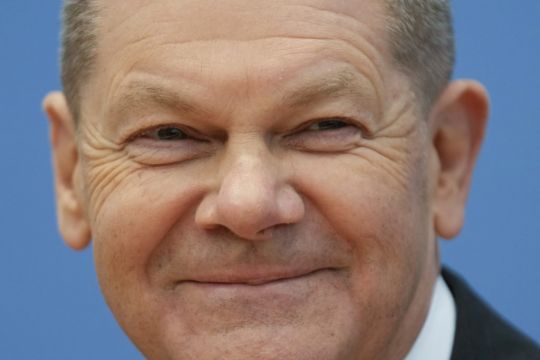Olaf Scholz is set to take office as Germany’s ninth post-war chancellor, succeeding Angela Merkel after her 16-year tenure.
Mr Scholz’s government takes office with high hopes of modernising the European Union’s most populous nation and combating climate change, but faces the immediate challenge of handling Germany’s toughest phase yet of the coronavirus pandemic.
The 63-year-old, Germany’s vice chancellor and finance minister since 2018, brings a wealth of experience and discipline to an untried coalition of his centre-left Social Democrats, the environmentalist Greens and the pro-business Free Democrats.
The three parties are portraying the combination of former rivals as a progressive alliance that will bring new energy to the country after Mrs Merkel’s near-record time in office.

Mr Scholz will need the support of at least 369 legislators in the 736-seat lower house of parliament to be elected as chancellor.
The coalition partners have 416 seats between them, so he should be assured of a comfortable majority.
“We are venturing a new departure, one that takes up the major challenges of this decade and well beyond that,” Mr Scholz said Tuesday, adding that if they succeed, “that is a mandate to be re-elected together at the next election”.
The new government aims to step up efforts against climate change, expanding the use of renewable energy and bringing Germany’s exit from coal-fired power forward from 2038, “ideally” to 2030.
It also wants to do more to modernize the country, including improving its notoriously poor mobile phone and internet networks.
It also plans more liberal social policies, including legalising the sale of cannabis for recreational purposes and easing the path to German citizenship, while pledging greater efforts to deport immigrants who do not gain asylum.

The coalition partners also want to cut the voting age in national elections from 18 to 16.
There will be an increase in the minimum wage to 12 euros (£10) per hour from the current 9.60 euro, which Mr Scholz has said “means a wage increase for 10 million”.
The coalition also aims to get 400,000 new apartments per year built in an effort to curb rising rental prices.
Mr Scholz has signalled continuity in foreign policy, saying the government will stand up for a strong European Union and nurture the trans-Atlantic alliance.
The alliance brings both opportunities and risks for all the participants, perhaps most of all the Greens.
After 16 years in opposition, they will have to prove that they can achieve their overarching aim of cutting greenhouse gas emissions in a three-way alliance with partners who may have other priorities.
Green co-leader Robert Habeck will be Mr Scholz’s vice chancellor, heading a revamped economy and climate ministry.

The government’s number three official will be Christian Lindner, the finance minister and leader of the Free Democrats, who insisted that the coalition reject tax hikes and loosen curbs on running up debt.
The incoming government is portraying itself as a departure in both style and substance from the “grand coalitions” of Germany’s traditional big parties that Mrs Merkel led for all but four years of her tenure, with the Social Democrats as junior partners.
In those tense alliances, the partners sometimes seemed preoccupied mostly with blocking each other’s plans.
Mrs Merkel’s final term saw frequent infighting, some of it within her own centre-right Union bloc, until the pandemic hit.
She departs with a legacy defined largely by her acclaimed handling of a series of crises, rather than any grand visions for Germany.







